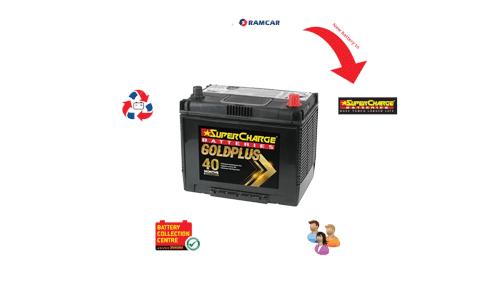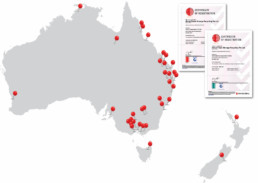WORLD LEADING ULAB RECYCLING
Established in 2007, our Used Lead Acid Battery (ULAB) recycling and collection program has become industry leading, providing innovative resource recovery solutions and management programs that meet the needs of businesses and the environment.
We differentiate ourselves by offering businesses an accredited, nation-wide solution for the collection, recycling and reprocessing of ULAB through our state-of-the-art recycling facility in New South Wales. Just another reason why SuperCharge Batteries is the ultimate battery solutions partner for your
business.
ULAB RECYCLING PROCESS

COLLECTION
Accredited, national collection program

SEPARATION
Broken down into metal, plastic & acid

TREATING
Acid converted for use in detergent & fertiliser

RECYCLING
Plastic casing broken down for recycling

REFINEMENT
Metal refined into 99.97% pure lead ingots

REUSE
Lead distributed for use in new batteries

COLLECTION
Accredited, national collection program

SEPARATION
Broken down into metal, plastic & acid

TREATING
Acid converted for use in detergent & fertiliser

RECYCLING
Plastic casing broken down for recycling

REFINEMENT
Metal refined into 99.97% pure lead ingots

REUSE
Lead distributed for use in new batteries
NATIONAL COLLECTION NETWORK
We have collection agents and points across Australia. All agents and facilities are EPA compliant, insured and comply with all relevant legislation including:
- Environmental accreditation ISO14001
- Waste transport and waste storage licences
- Public Liability, vehicle, premise and goods insurance
WORLD CLASS RECYCLING FACILITY
Our best-of-breed lead recycling facility is located in Wagga Wagga, New South Wales. Our facility has the capacity to produce both an international standard of soft lead or alloys specially tailored to our clients requirements.
The feedstock used in our operation comes from nearly 4.5 million junk batteries collected each year.
OUR ENVIRONMENT
We are committed to implementing and maintaining best environmental practice and continuously improving through review, assessment and reporting. Lead is an infinitely recyclable resource and when recycled with SuperCharge Batteries, it adds real value to sustaining our modern way of life.
SUPERCHARGE BATTERIES PRODUCT LIFECYCLE
- Full aggregation service including collection, transport and recycling
- National network of collection agents and over 12,000 collection points
- Australia’s only ISO14001 accredited ULAB collection network
- Modern ULAB recycling facility with latest technology
- High level of responsibility for the benefit of the environment, community and workforce
- Global practice for environmental standards from battery collection to lead ingot production
- At least 99% of a battery recycled into reusable lead, polypropylene and sodium sulphate

SuperCharge Batteries offers a complete national network covering dozens of locations, each manned by experienced team members who thrive on delivering outstanding service by partnering with our clients’ businesses.
We know that it’s the people who make the difference which is why we are Your Battery Specialists

